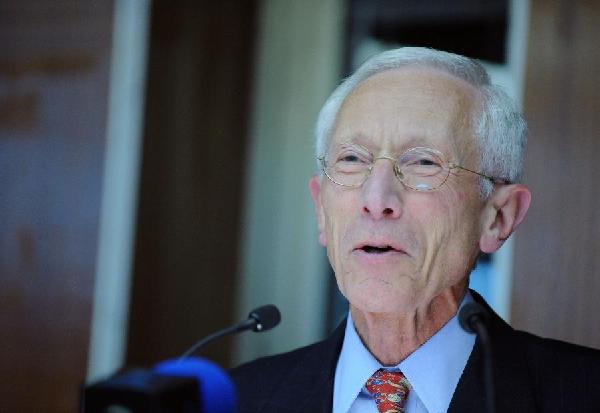 |
| File photo taken on Oct. 19, 2009 shows Stanley Fischer at Old Jaffa City near Tel Aviv, Israel. U.S. President Barack Obama on Friday nominated Stanley Fischer, the former governor of the Bank of Israel, as vice chairman of the Federal Reserve, the latest move to reshape the seven-member Fed Board. (Xinhua/Yin Bogu) |
WASHINGTON, Jan. 10 -- U.S. President Barack Obama on Friday nominated Stanley Fischer, the former governor of the Bank of Israel, as vice chairman of the Federal Reserve, the latest move to reshape the seven-member Fed Board.
If confirmed by the U.S. Senate, Fischer will succeed the Fed's vice chair Janet Yellen, who will replace Fed chairman Ben Bernanke to take the helm of the central bank in February.
Fischer "is widely acknowledged as one of the world's leading and most experienced economic policy minds and I'm grateful he has agreed to take on this new role and I am confident that he and Janet Yellen will make a great team", Obama said in a statement.
Obama also nominated Lael Brainard, former U.S. treasury undersecretary for international affairs, to serve as a Fed governor and renominated the current Fed governor Jerome Powell for a second term.
"These three distinguished individuals have the proven experience, judgment and deep knowledge of the financial system to serve at the Federal Reserve during this important time for our economy," said the president.
The three nominations, which are subject to confirmation by the Senate, will fill three openings on the seven-member Fed Board. This move came at a delicate moment when the Fed has just begun gradually normalizing its monetary policy as the U.S. economy picked up in recent months.
In December, the Fed announced that it would start in January to taper its purchases of Treasury and mortgage-backed debt to a pace of 75 billion dollars a month from 85 billion dollars a month.
However, many economists have expressed concerns that there could be significant spillover effects and unintended consequences as the Fed planned to unwind its massive monetary stimulus program, which triggered turbulence in emerging markets last summer. Analysts believed the veteran central banker and influential economist Fischer could bring much-needed experience of crisis management to the Fed and help relieve investors concerns.
Fischer, 70, who has dual citizenship of the U.S. and Israel, served as the Governor of the Bank of Israel from 2005 to 2013, where he successfully navigated Israel's economy through the global financial crisis.
Prior to joining the Bank of Israel, Fischer was vice chairman of Citigroup from 2002 to 2005. From 1994 to 2001, he served as the First Deputy Managing Director of the International Monetary Fund, where he addressed the Asian, Russian, Brazilian and other financial crisis of the late 1990s.
Before that Fischer was an economics professor at the Massachusetts Institute of Technology in the 1970s and 1980s, where he taught a number of the world's top policy makers in international economics, including Fed Chairman Ben Bernanke and European Central Bank President Mario Draghi.
 In photos: Ten 'tuhao' devices in 2013
In photos: Ten 'tuhao' devices in 2013 College students saved from an ice hole by brave citizens
College students saved from an ice hole by brave citizens Gallery: Top 10 box office hits in 2013
Gallery: Top 10 box office hits in 2013 Beautiful churches around the world
Beautiful churches around the world Yang Mi, Hawick Lau hold wedding in Bali
Yang Mi, Hawick Lau hold wedding in Bali 'Phubbing' people seen everywhere
'Phubbing' people seen everywhere World's biggest snack shop in China
World's biggest snack shop in China Shocking moments when PLA's weapons open fire
Shocking moments when PLA's weapons open fire World's fastest train CRH380A assembled in E China
World's fastest train CRH380A assembled in E China Top 10 box office hits in 2013
Top 10 box office hits in 2013 In photos: Ten 'tuhao' devices in 2013
In photos: Ten 'tuhao' devices in 2013 Real estate tycoon measures PM2.5
Real estate tycoon measures PM2.5  'I am on a journey to lose weight'
'I am on a journey to lose weight' 'Cute' artifacts exhibited in Nanjing Museum
'Cute' artifacts exhibited in Nanjing Museum Advanced Chinese weapons that stepped into spotlight in 2013
Advanced Chinese weapons that stepped into spotlight in 2013Day|Week|Month